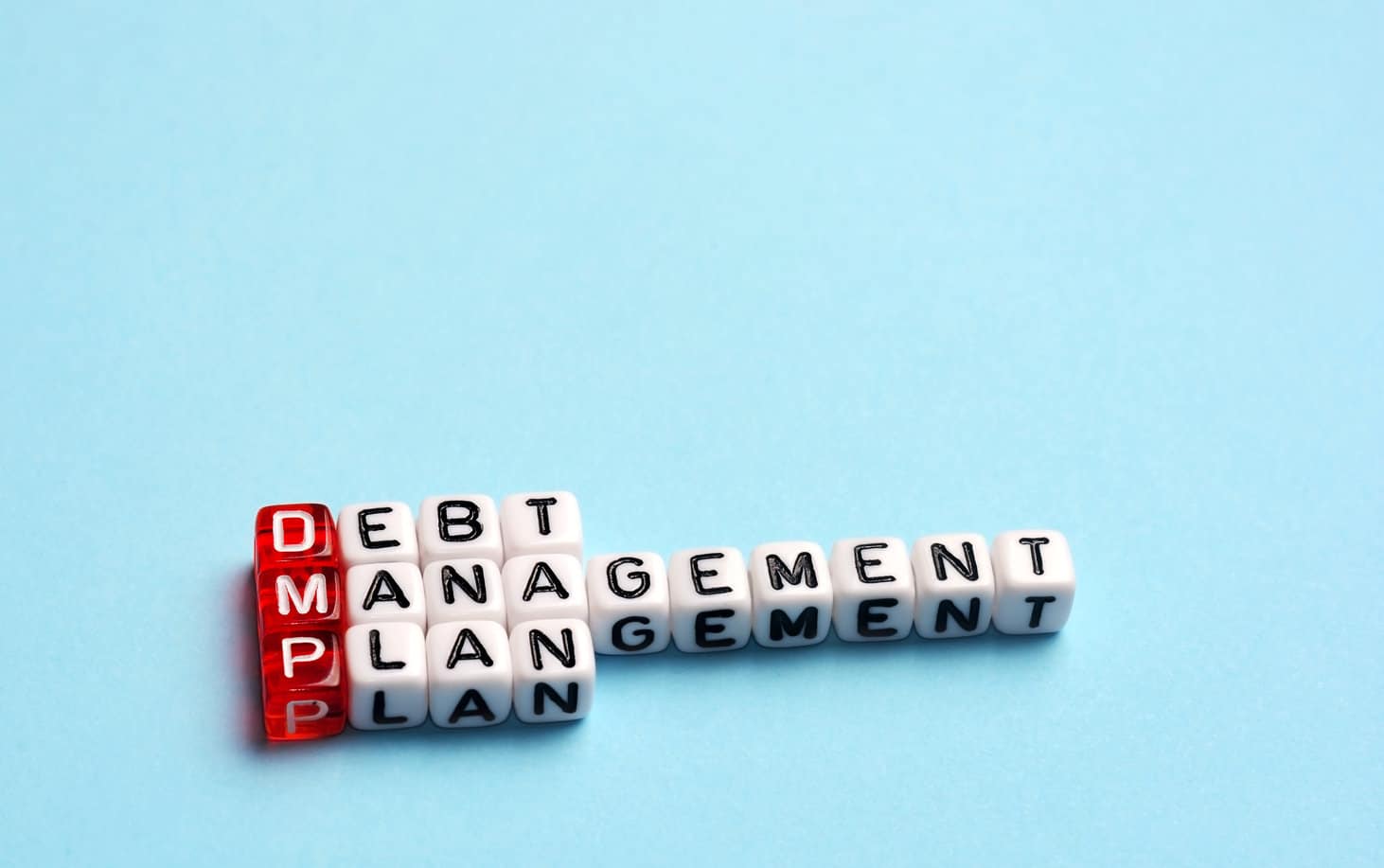Jasmine Birtles
Your money-making expert. Financial journalist, TV and radio personality.


If you’re in debt and looking at your various options, the number of acronyms and technical terms might seem intimidating. What is a debt management plan (DMP), and how can you get one? Should you consider an individual voluntary agreement (IVA) instead? What’s the difference between a DMP and IVA? Who is involved in helping you manage these processes?
Don’t worry – we’re here to break down the confusing terms so that you know exactly what they mean. Hopefully, once you’ve read this article, you’ll be in a good position to know what you need to do to sort out your finances and, with a set plan, get back in the black.

Facing debt is a scary prospect – but, like the laundry or the washing up, the longer you leave it, the more of a task it becomes. The moment you feel overwhelmed and unable to meet your monthly repayments, seek debt help.
It could be something as simple as requesting a payment holiday, if you’ve been affected by the recent pandemic. Or, you could ask your creditors to freeze your interest payments for a couple of months to give you a little more breathing space. In some circumstances, a consolidation loan could help you avoid any defaults on your credit file and give you time to repay a manageable amount each month.
However, if you feel that you won’t be able to recover from your debt problems within a short space of time, you’ll need to seek extra help. Try contacting charities like Community Money Advice to learn more about financial management, budgeting, and debt help, as a first step.
A debt management plan is for those with smaller debts to repay. They’re often the first port of call for people struggling with debt following a life event, such as redundancy or illness, and buys some extra time for you to repay your debts to your creditors before any legal action.
A debt management plan is privately agreed between your creditors (the people you owe money to) and yourself, sometimes with the help of experts from charities like StepChange. Charities will set up your debt management plan without charging a fee. There are some companies that offer to do the same for a fee – don’t do it! They’ll do the same as the charities will – and StepChange and National Debtline are for anyone, so there’s no need to pay for a DMP.
When drawing up the plan, all of the interested parties negotiate and agree on a rate for you to repay each month. This might involve freezing interest on your debts, in order to make them more manageable (but it won’t always). A ‘Token DMP’ is often the first step: for many, this means 12 months where you pay just £1 a month and your interest is frozen. This means you’ve got a year to work on building a fund to pay your debts off – it breaks the ‘work-expenses-debt-interest’ cycle and gives you breathing space. It’s especially useful if you’ve just lost your job or income, as it buys you time to find other ways of earning money.
The charity that is helping you will divide up the money you pay to them and distribute it between your creditors for you, saving you a lot of hassle and meaning you don’t need to pay companies back individually. They’ll not give an equal portion to each creditor. Instead, they pay a proportion of your monthly payment – so the biggest debt gets the largest percentage. This is so that you can whittle down each debt at a rate that’s acceptable to your creditors AND makes sure each debt is paid off in good time.
A debt management plan is not enforced by a court. It will affect your credit rating, but not in the same way that an IVA will (see below for more on that). Every creditor will record a default on your credit score each month that you don’t repay your debt in full. These defaults will stay on your record for up to six years. When you’ve paid off your debt, it’s marked as ‘satisfied’ rather than ‘settled’, to show there had been defaults but the debt is paid off.
A debt management plan should be your first port of call if you’re looking to pay off debts that have got out of control. Some of the benefits include the following:
Of course, the flexibility of a debt management plan can work against you, too. Because the plan isn’t legally enforced, if you can’t make your repayments or have trouble keeping track of what you owe you could end up not paying off your creditors as planned. The onus is on you to stay on top of your money with a debt management plan.
Other potential negatives include:

If you’re in debt, start with a debt management plan. If that doesn’t help and you don’t manage to clear your debts, you may move to an individual voluntary agreement in order to try and avoid bankruptcy.
An individual voluntary agreement is enforced by an insolvency practitioner and agreed by the courts. An insolvency practitioner might be an accountant or a lawyer with specialised skills in this area. You can’t arrange an IVA yourself – you have to use an insolvency practitioner. Again, StepChange and National Debtline can help you set up an IVA.
Individual voluntary agreements are a bit like bankruptcy, but are not as extreme. Often, they are used as a way to avoid individuals having to declare themselves bankrupt.
Having an individual voluntary agreement will definitely affect your credit score, but you could recover faster than bankruptcy. It won’t affect other things either, such as your legal right to become a director of a company as bankruptcy would, for example.
You have to have debts above a certain amount (sometimes as low as £5000, but often £15,000) to be eligible. The amount depends on the practitioner you use. The good news is that a lot of this debt is likely to be written off if you can’t afford to repay all of it within six years.
Unlike a debt management plan, where you choose to repay the money, an IVA practitioner basically controls your money for you. Similar to bankruptcy, you’re on strict living-expenses-only until the IVA is over. Almost all surplus goes towards your debts.
The agreement will see you pay back the debts that you have to your creditors over a period of time, usually in monthly chunks. At the end of six years, if you’ve not repaid your whole debt, the rest is written off. This means it’s much longer than bankruptcy (which is usually a year long), but is far less damaging in the long-term than being a bankrupt.
Yes, it is legally binding and is enforced by a court. This means that you have to stick to your repayments. The good news, though, is that your creditors do too – so once the agreement is in place they can’t demand the debt is repaid any more quickly or in larger amounts. This makes it different to a debt management plan, which is less formal.
There are numerous benefits to an individual voluntary agreement:
Of course, there are negatives to have an individual voluntary agreement too – but this is hard to avoid. Getting out of debt is never going to be a completely easy ride! Here are some of the things that you need to be aware of if you’re going to enter into an individual voluntary agreement:
We hope this has helped you become a bit more clear about the differences between a debt management plan and an individual voluntary agreement. Now, it’s time to consider your own finances and decide which is the right path for you.
Have you cleared your debt by taking out an individual voluntary agreement or a debt management plan? Let us know over on the forums.
The most important thing when you’re facing a debt mountain is to arm yourself with plenty of information. It’ll help you take control of the situation! Read these articles for more guidance about managing debt.

A good article on a very important subject. Thank you.